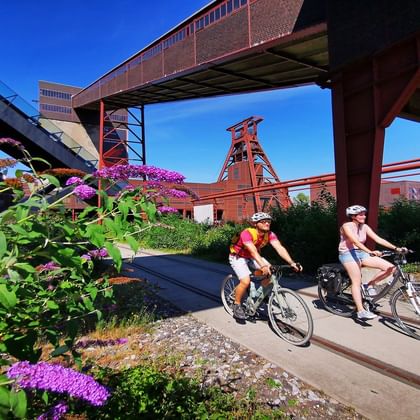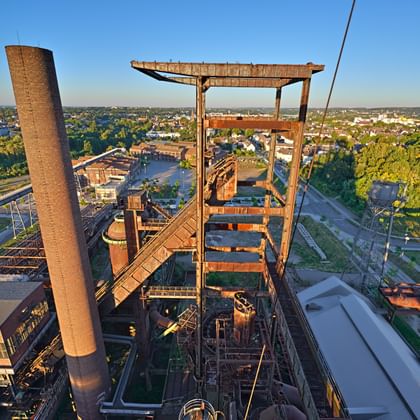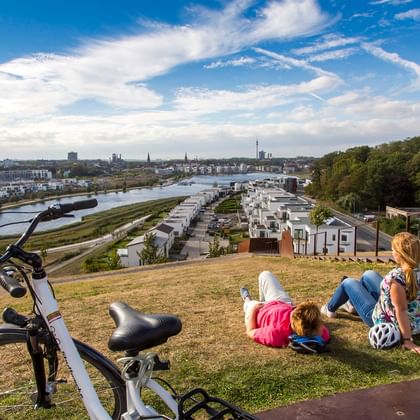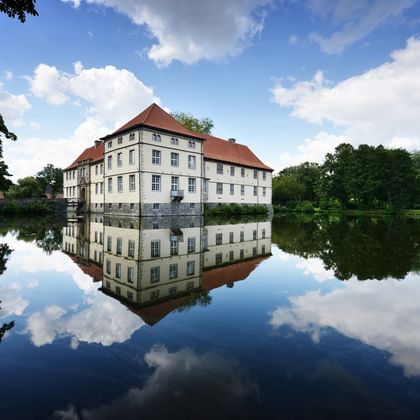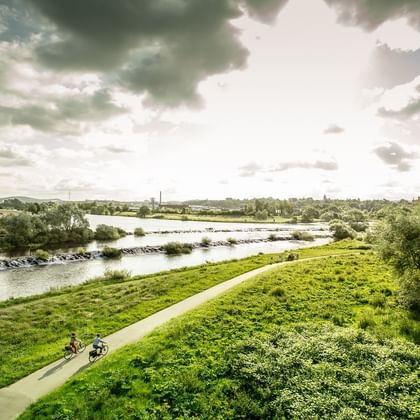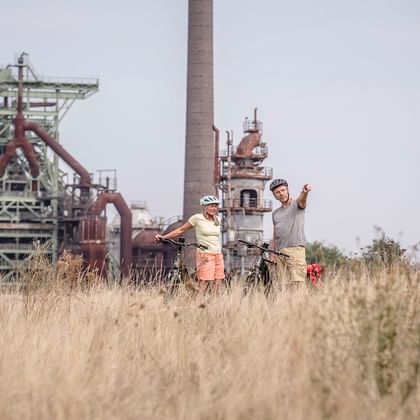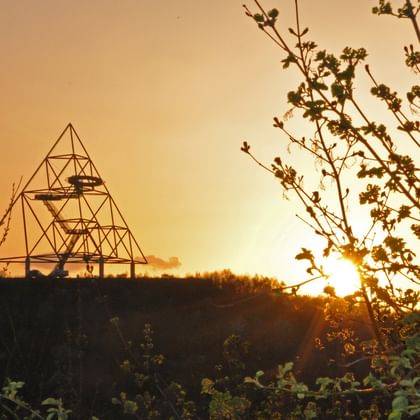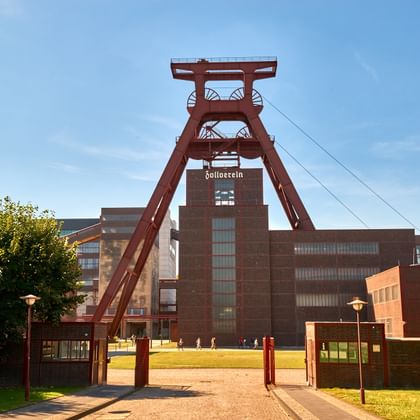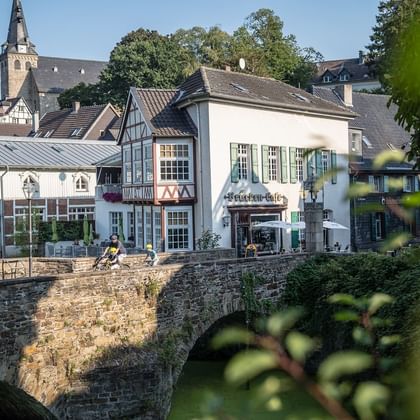Tour
All places in the Ruhr area can be easily reached by train or car, including Herne. If you arrive early, you can plan an excursion to the German Mining Museum in Bochum or to the heritage-listed substation in Recklinghausen with the “Electricity and Life” museum to get in the mood for the next few days.
In the morning you cycle directly on the quiet cycle path "Route der Industriekultur" along the Rhine-Herne Canal to the "Henrichenburg ship lift industrial museum", a "14 meter elevator for ships" from 1899, which was considered a technical masterpiece when it was built. The steel construction is explained in the historical machine hall and museum ships are at anchor. Then follow the well-developed Emscher cycle path towards Dortmund, where you can cycle through the first ecological sections from the generation project “Emscher conversion”. Excursions to the Hansa coking plant and the Borussia Dortmund football stadium are possible on the way. The gigantic structure of the Phoenix West ironworks, which was active until 1998, is right next to the bike path in the afternoon. Your guided walk around the impressive industrial monument begins here, where you will learn interesting facts about the blast furnace plant and its transformation. You can then enjoy the evening at Phoenix Lake, Dortmund's new landmark and leisure area with a wide range of restaurants on the beautiful promenade, or in Westfalenpark, not far from Signal Iduna Park, home of BVB.
The city exit leads past the Phoenixwerk once more and along the extensive green area of the Rombergpark. You will quickly reach rural surroundings with horse farms and agriculture . Here you cycle on the 'Rhenish Esel', a disused railway line, into the Ruhr Valley to Witten. Soon you come to the "cradle of Ruhr mining" with the Muttental circular route, where over 60 small mines were in operation in the 18th century and the coal seams come to the surface and the Nachtigall colliery, which was opened in the 19th century as one of the first underground mining shafts went into operation. Here you go in the visitor mine, equipped with a helmet and miner's lamp. You walk in a horizontal underground tunnel to a real coal seam and get to know the technology and difficult working conditions of the miners in the 19th century. In the historical machine house you will experience a photo exhibition. In the afternoon you cycle on the well-developed Ruhr valley cycle path. You can take a break at the dammed lake Kemnader, and finally come to Hattingen with its half-timbered idyll in the historic center.
The day begins with an exciting tour of the Henrichshütte Industrial Museum Hattingen. You will see the oldest blast furnace in the area, which was in operation until 1987. 10,000 people worked on the huge area, producing coke, iron and steel and casted, rolled and forged the metal. Back in the saddle, you cycle the entire day on the comfortable Ruhrtal cycle path through the green landscape, take a short excursion to the Bochum Railway Museum and relax on the shores of Lake Baldeney. In the afternoon, it is worth visiting Villa Hügel with its extensive English landscape park. The palace-like villa, was built by the industrialist Alfred Krupp as his own residential and prestigious house. It has 269 rooms which today represent the multi-layered Krupp history of the company and family in historical rooms. Back on the Ruhr valley cycle path, it is not far to Kettwig with its cute old town and the Mühlengrabenbrücke directly at the Ruhr.
Today's cycling day on the Ruhr Valley Cycle Path is again peppered with highlights. The award-winning Aquarius Water Museum in Mühlheim with its multimedia museum on 14 levels lies on the short bike stage so that you reach Duisburg in the early afternoon. You have enough time to take part in a harbor tour through the world's largest inland port. The widely ramified navigable waterways in the Ruhr area were considered to be the lifelines of heavy industry and the port of Duisburg as the most important transshipment point. In the evening you can stroll in the urban inner harbor, which serves as a prime example of the structural change in the Ruhr area. Here, where the city's central port and trading center was for over a century, is now a place that combines work, living, culture, gastronomy and leisure in an attractive location at the water.
Today's stage offers everything you can imagine on this trip: You cycle a short distance on the Rhine Cycle Path and then follow the “Route of Industrial Culture” cycle path to the Duisburg-Nord Landscape Park. This disused ironworks has become a big city oasis with around 250 cultural events and 1 million visitors per year. (The British daily newspaper The Guardian counts the Landschaftspark Nord among the ten best city parks in the world.) Here you can experience a guided tour by bike. You cycle through the 180 hectare area and learn everything about the history of the ironworks, the adjacent coking plant and the present day diverse leisure, recreation and sports offers on the spacious grounds.
You then cycle on a disused freight railway line to Oberhausen, where you can visit the famous Gasometer. From here the “Route of Industrial Culture” cycle path continues to the Bottrop Tetrahedron, the viewing platform with an all-round view of what was once a mighty spoil dump. In the afternoon the route leads through the former colliery settlement Gartenstadt Welheim and again on a former railway line to Essen directly to the Zollverein colliery.
The day begins on foot with a guided tour through the Zeche Zollverein (UNESCO World Heritage Site and known as the most beautiful colliery in the world) and an individual visit to the Ruhr Museum in the former coal washing plant of the Zeche Zollverein. Together with the impressions of the last few days, the picture of the unique history and development of the Ruhr area is now complete. Back in the saddle, you cycle on a former colliery railway line to the iconic cycling meeting point "Holgers Erzbahnbude", where you have the best opportunity to eat the original red and white "Currywurst" (curried sausage). In the afternoon there is a real highlight on the route, you reach the Hoheward waste dump, which, together with the Hoppenbruch dump, forms the largest dump landscape in Europe with around 220 hectares. Today it is a developed local recreation area and offers a variety of viewing platforms on the balcony promenade which is leading around it. And those who make it to the top will be rewarded with the best all-round view of the entire trip. Here you can't stop being amazed - the Ruhr area is so green in front of you, no matter where you look! Over the dragon bridge it goes down again and soon Herne is reached and the eventful round tour comes to an end.
You have now got to know the Ruhr area on beautiful bike paths and on many visits on water, land, in the air and underground - and you probably fell in love with it! Even after the end of this trip, you will remember this unique cultural landscape in Europe for a long time!
Map
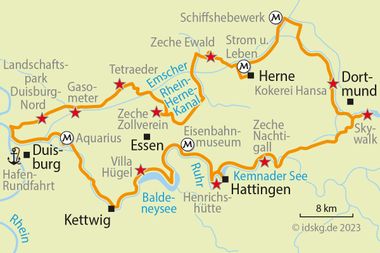
Prices / Dates
Services / Info
- Overnight stay with breakfast: Comfortable middle-class hotels, mostly in the center
- Room with D/bath/WC
- Luggage transport
- Digital route guidance via smartphone app
- Tips for trip preparation
- Tourist information
- 7-day hotline service
further included services
- Walk round the blast furnace plant Phoenix West
- Guided tour underground LWL industrial museum, Zeche Nachtigall
- Guided tour LWL industrial museum Henrichshütte Hattingen
- Guided tour by bike in the landscape park Duisburg Nord
- Guided tour Zeche Zollverein (UNESCO World Heritage Site)
Please note that these guided tours are only available in German language!
Worth knowing about the bike tour Ruhr: Round trip
Below you will find specific and helpful information. If you have further questions about this trip, you simply call us: Phone: +49 (0)6421 – 886890.
Arrival by train
Herne is easily accessible from all major cities in Germany by train. The preffered starting hotel in Herne is about 1.5 km from Herne train station. The best way to get there is with a short taxi ride. Current schedule information and price information can be found at: www.bahn.de.
Parking facilities at the arrival location
The hotel in Herne has free parking spaces. that cannot be pre-reserved. In addition you may leave your car in the streets near the hotel. You will receive detailled information on the parking facilities together with your travel documents 2 weeks prior to your arrival.
Condition of cycle paths
The varied round tour was specially designed by Velociped. You usually cycle on separate cycle paths, or along the river or canal, or on disused railway lines. You rarely cycle on small or large roads without a separate cycle path. The tour is mostly flat, with short climbs only around Dortmund. Two worthwhile rises to former spoil heaps with a beautiful all-round view are optional. The route that has been worked out is well signposted and the junction system also facilitates orientation. You will receive our special Bikeline as map material with an exact route description (in German language).
Travel services which are included in the tour price
The trip through the Ruhr area includes 5 exciting tours of cultural highlights in the Ruhr area:
If you do not wish to take part in the guided tours, the tour price is reduced by € 50.00 per person.
- Guided tour around "Phoenix-West"
The Phoenix-West blast furnace plant is an impressive industrial monument that reflects the history of steel production in the region. Learn interesting facts about the Phoenix West site and its transformation on a guided walk around the blast furnace plant. - Guided tour of the underground LWL industrial museum, Zeche Nachtigall
A guided tour through the visitor mine is one of the highlights of the museum visit. Equipped with a helmet, you advance to a coal seam in Hettberg, learn how to work with a jackhammer and compressed air drill and experience the typical atmosphere of a coal mine on the Ruhr “on site”. - Guided tour of the LWL industrial museum Henrichshütte Hattingen
The oldest blast furnace in the area is on the Henrichshütte in Hattingen. Let yourself be fascinated by the relics of the ironworks, marvel at the huge gas machines, enjoy the panoramic view from the blast furnace and visit the show foundry in the Bessemer steelworks, where metal is flowing again today. - Guided tour by bike in the Duisburg-Nord landscape park
On a bike tour you can explore the diversity of the Duisburg-Nord Landscape Park - safely guided over secret paths and old railway embankments. Compared to the guided tours on foot, you have the advantage of exploring the 180 hectare area in full. You can find out everything about the history of the iron and steel works, the adjacent Friedrich Thyssen 4/8 colliery and coking plant. - Guided tour of the Zollverein Coal Mine UNESCO World Heritage Site
Discover industrial history in a place that stands for superlatives like no other: Get to know what was once the largest and most powerful coal mine in the world and the largest central coking plant in Europe. The colliery has been a UNESCO World Heritage Site since 2001.
Please note that these guided tours are only available in German language!
Extra costs which are not included in the tour price
Further sightseeing options are on the route, these must then be paid for on site. Likewise, any tourism tax and charging fees for bicycle batteries are not included in the tour price and must therefore be paid at the hotel.
7 day hotline service
Just in case the bike chain breaks, flooding makes it impossible to continue your tour or any other nasty surprise: You can reach us seven days a week and we will do anything to help you as fast as possible.
Passport and visa requirements
For EU citizens, there are no special passport or visa requirements and no health formalities to be considered for this trip.
Travel insurance
The tour price already includes the statutory insolvency insurance. In addition, we recommend that you take out travel cancellation insurance upon receipt of your travel confirmation in order to protect yourself against financial disadvantages in the event of travel cancellation, interruption of travel, illness or accident.
Englisch: For this trip, we recommend using digital travel documents in the interest of sustainability. However, if you prefer, you can choose printed travel documents with a cycling map during the booking process. Please note that price differences may apply depending on your selection.
Individual travellers are also very welcome - we will be happy to make you an individual offer.
Available rental bikes
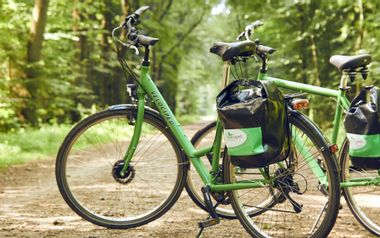
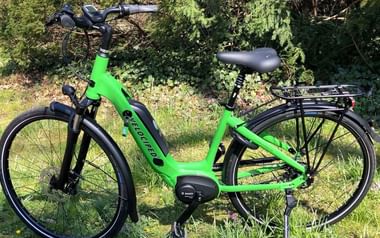

The 27-speed tourer is the best choice for cyclists that value the advantages of the dérailleur gear shift for flexibility whilst going up and down hills. This bike allows you to be a little more active without compromising on saddle comfort and practical everyday suitability.

E-bikes combine a lot of advantages. The electric drive ensures a completely relaxed cycling, even during long tours or on hilly routes. Other features, such as a suspension seat post and front fork plus well-tuned gears, ensure additional riding comfort.

I provide you with advice and assistance
Miriam Houda
